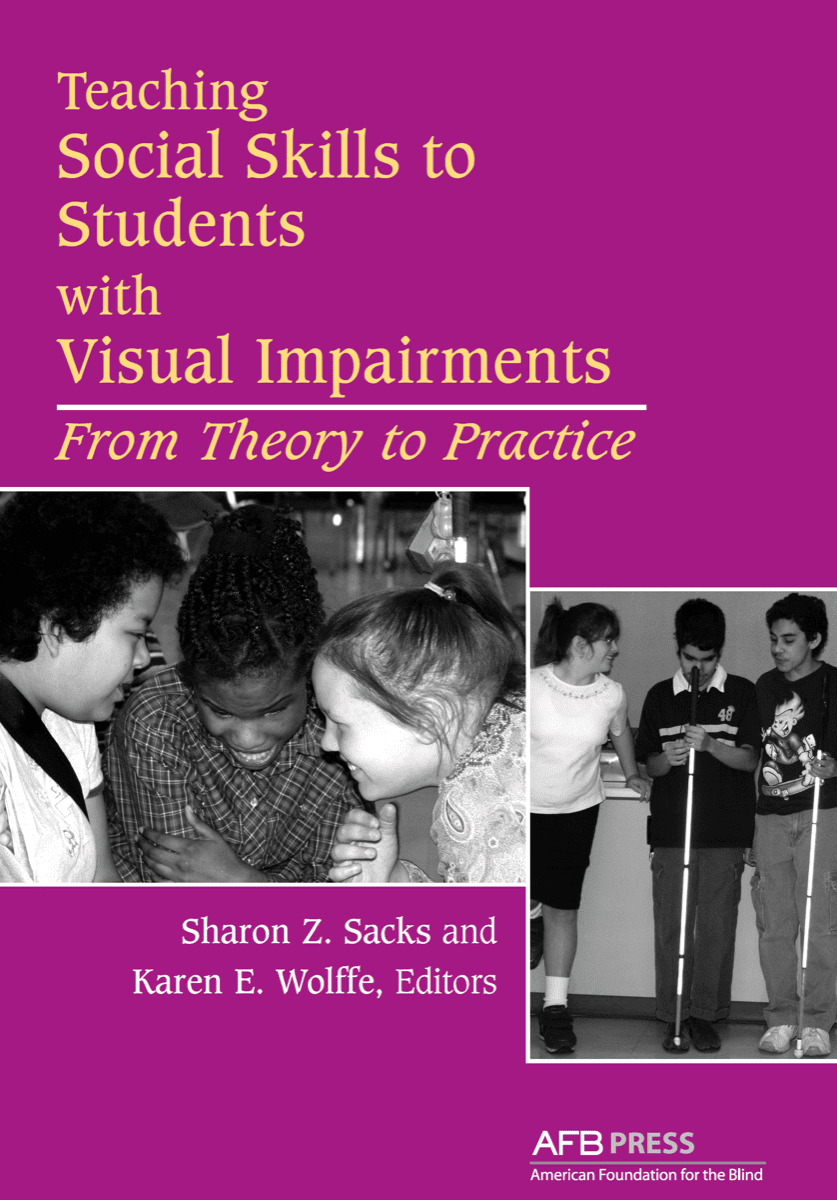Teaching Social Skills to Students with Visual Impairments: From Theory to Practice
Addresses the systematic development of skills in listening for and interpreting auditory information as they relate to literacy, independent travel, and sensory and cognitive development.
This item is made to order and is non-refundable.
$49.95
Catalog Number: F-B0050-00
Publishers: APH Press
Authors: Karen E. Wolffe, Sharon Zell Sacks
ISBN: 978-0-89128-882-4
Product Description
How do children become social beings? When a child is unable to observe visually and imitate how other people react, this complex developmental process can become fragmented, and incomplete. As a result, providing specific information, direct instruction, and opportunities for social interaction to children who are blind or visually impaired is critical to their growth and education.
Edited by two groundbreaking educators and researchers, with contributions from other educators and researchers in this area, Teaching Social Skills to Students with Visual Impairments: From Theory to Practice explores what theory can tell us about how children who are visually impaired become socially skilled individuals. It then, presents a compendium of techniques and strategies for helping youngsters, from preschoolers through young adults, including those with additional disabilities, develop and refine social skills.
To view the Table of Contents, please see the “Includes” section.
This item is made to order, therefore all sales are final.
-
Acknowledgments
Foreword
Introduction
PART I Personal Viewpoints
1 The Development of Social Skills: A Personal Perspective
2 A Family Perspective on Social Skills Development
PART II Theories of Social Development
3 Theoretical Perspectives on the Early Years of Social Development
4 Theoretical Perspectives on the Development of Social Skills in Adolescence
PART III The Elements of Social Success
5 Promoting and Nurturing Self-Esteem
6 Developing Friendships and Positive Social Relationships
7 The Importance of Peers and Role Models
8 Social Skills in School and Community
9 Social Skills Assessment
PART IV Intervention and Practice
10 Teaching Social Skills to Young Children with Visual Impairments
11 Teaching Social Skills to Elementary and Middle School Students with Visual Impairments
12 Teaching Social Skills to Adolescents and Young Adults with Visual Impairments
13 Teaching Social Skills to Students with Multiple Disabilities
Appendixes
Recommended Readings and Other References
Resources
Index
About the Contributors
Narrative Descriptions
-
Federal Quota Funds: Not Available
Publishers: APH Press
Authors/Editors: Karen E. Wolffe, Sharon Zell Sacks
-
-
- Table of Contents:
- The Development of Social Skills: A Personal Perspective
- A Family Perspective on Social Skills Development
- Theoretical Perspectives on the Early Years of Social Development
- Theoretical Perspectives on the Development of Social Skills in Adolescence
- Promoting and Nurturing Self-Esteem --Developing Friendships and Positive Social Relationships
- The Importance of Peers and Role Models
- Social Skills in School and Community
- Social Skills Assessment
- Teaching Social Skills to Young Children with Visual Impairments
- Teaching Social Skills to Elementary and Middle School Students with Visual Impairments
- Teaching Social Skills to Adolescents and Young Adults with Visual Impairments
- Teaching Social Skills to Students with Multiple Disabilities
-
Customer Service and Technical Support
Toll-Free: 800-223-1839 (U.S. and Canada)
Fax: 502-899-2284
Email: cs@aph.org
Hours: Monday–Friday 8:00am–8:00pm EST -
Contact Customer Service to discuss your warranty options.

